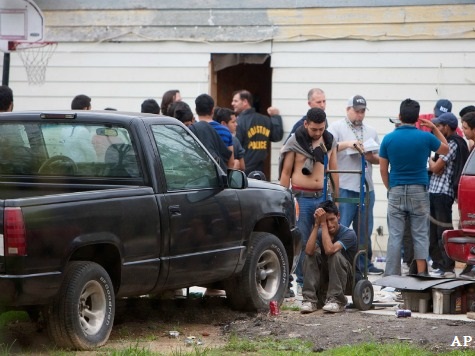
HOUSTON, Texas–It was recently revealed that illegal immigrants with scabies who were apprehended in the Rio Grande Valley (RGV) area passed on the infestation to several U.S. Border Patrol agents. In the face of this news, Breitbart Texas has learned that the thousands of illegal immigrants detained on the Texas-Mexico border each day are not screened for diseases or infections.
“We don’t screen for diseases,” RGV Border Patrol spokesman Omar Zamora told Breitbart Texas. “All we are is a processing center, so we don’t do that.”
He added that illegal immigrants are only brought to hospitals for treatment when they raise a concern to the attention of Border Patrol agents. This is the case regardless of what the illegal alien may have–whether it be an infection like scabies or something more serious like cancer.
Sharp increases in illegal immigration into the U.S. this year has caused processing facilities to become overcrowded. Authorities do not have time or resources to screen every apprehended illegal immigrant for diseases.
The RGV sector alone catches about 1,000 illegal immigrants per day. Processing usually takes between one to two hours per individual. However, since facilities have become backed-up, overcrowded, and strained on resources, an illegal immigrant may have to wait several months before being processed.
Overcrowding in processing facilities has made it difficult to identify and quarantine infected detainees. Many are concerned that scabies and other illnesses may be passed onto the general public.
Zamora said that illegal immigrants are likely contracting scabies in human stash houses before being apprehended by Border Patrol agents. “Scabies spreads with close skin contact,” he said. “Typically [the immigrants] get to stash houses in Mexico until they decide it’s time to cross into the U.S. Then, if they do make it here, they’re put in another stash house where there could be hundreds of individuals in a small space. This are all situations of close contact. They can get [scabies] anywhere along their travels so its hard to figure out where, exactly, it’s being spread.”
Border Patrol agents are left with few ways to protect themselves against potential diseases once detainees are brought to processing facilities.
Zamora mentioned that agents are allowed use rubber gloves, long sleeves, and a mask for protection when dealing with captured illegal immigrants.
He added, “As Border Patrol is looking at revamping and making things more efficient, they’ve talked about putting a medical footprint in some of these sectors. Like putting a nurse or physician’s assistant there so they can pre-screen for minor issues so you don’t need to take [detainees] to the E.R. for scabies or head lice. It would be more efficient and at the same time, the immigrant would get care.”
Although the RGV Border Patrol sector has not yet released the exact number of detainees or agents with scabies, an investigation is reportedly being launched into the matter.
Texas Congressman Ruben Hinojosa released a statement that said, “I have made a formal request to the Department of Homeland Security to investigate the reports of overcrowding and disease among the detainees at the McAllen Border Patrol facility.”
Follow Kristin Tate on Twitter @KristinBTate.

COMMENTS
Please let us know if you're having issues with commenting.